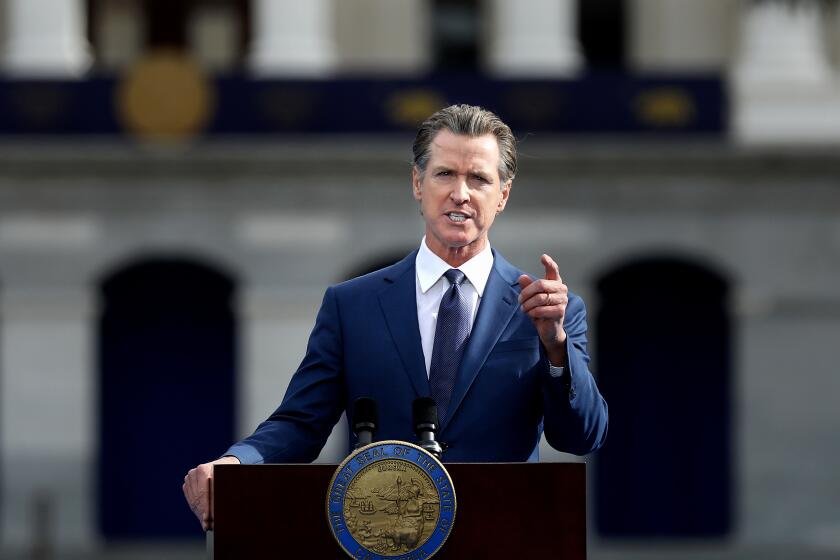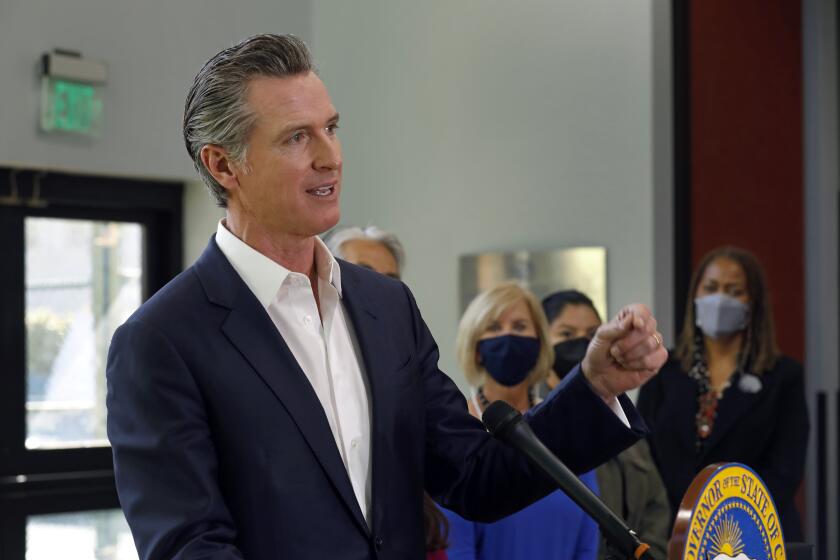Column: Newsom learned with oil bill: Working with lawmakers is key to passing laws

SACRAMENTO — Gov. Gavin Newsom did something new — for him. He got aggressively engaged behind the scenes, negotiating with legislators. And it paid off.
Personal, hands on, face-to-face engagement — the kind that’s uncharacteristic of this governor.
As a result, Newsom won a huge political and policy victory over Big Oil, as he’ll undoubtedly be reminding Californians and telling all of America for years to come.
The governor didn’t get all he originally asked for. The Legislature spurned his initial idea. But he wisely backed off and settled for less.
Gov. Gavin Newsom’s amended proposal would give the California Energy Commission more authority to investigate gasoline price spikes and cap profits.
Actually, what Newsom got was more practical and much superior to what he first wanted.
“This is 10 times better,” he acknowledged at a bill-signing ceremony in the state Capitol rotunda Tuesday.
“We proved we can actually beat Big Oil.”
“There’s a new sheriff in town. ... We brought Big Oil to their knees.”
Among liberal Democrats who rule California state government, the oil industry has replaced Big Tobacco as the No. 1 bogeyman. Tobacco has become so politically weak there’s no longer much gain in attacking it.
The California Democratic Party won’t accept contributions from oil interests. But moderate Democratic candidates will. One independent committee funded by four oil companies spent more than $8 million on legislative races in last year’s election. So the oil lobby still packs a punch in the Legislature.
But polls show the public is becoming increasingly concerned about climate change and greenhouse gas emissions spewed by gasoline automobiles.
Climate and record-high gas prices last year — along with the knowledge that Californians at one point were paying $2.60 more per gallon than the national average — provide strong public support in the Capitol for battling the oil industry.
But it wasn’t enough support for legislators to buy into Newsom’s initial request. In a typically passionate announcement in September, he called for punishing “greedy Big Oil” with a “windfall” profits tax.
The T-word ultimately was switched to “penalty” to make it seem more like a fee. A fee would require merely a simple majority legislative vote rather than a two-thirds supermajority.
“They’re ripping you off,” Newsom said. “With the Legislature, we’re going to pass a price-gouging penalty to hold Big Oil accountable.”
Not so fast. Legislators balked. Neither they nor the governor had evidence that oil companies were gouging. And they didn’t have the expertise to determine when a profit became an unwarranted windfall.
“How do you do a profits tax? Nobody has been able to do that in the United States or in the world,” one senior legislative aide told me.
But Democrats loyal to the governor wanted to provide him with some victory.
California Gov. Gavin Newsom launched an offensive in his war with Big Oil. The battle didn’t go as planned.
So, Newsom shifted gears and offered a better plan: Bump the whole thing to the California Energy Commission.
Create a new independent investigative division, require oil refineries to share long-hidden data with the unit and allow the experts to determine whether there’s gouging and windfall profiting.
The energy commission then could establish a cap on justifiable profits and punish refineries that exceeded it. The punishment presumably would be a fine — or a job-killing tax, if you’re a Republican supporter of the oil industry.
After that, Newsom didn’t just pontificate and rail. He rolled up his sleeves and worked with skeptical legislators to write a finished bill.
This governor has earned a reputation for overpromising and not delivering — making grandiose pronouncements but not following through. Dumping proposals on the Legislature, but aloofly standing back and not helping to get them passed. That irked legislators.
Starting his final term, however, Newsom seems to now realize that if he’s going to produce landmark achievements, time is growing short. This year and the next are crucial. Nothing much is likely to be accomplished in his lame-duck final year, 2026.
“Newsom went to the mat on this one,” says Jamie Court, president of Consumer Watchdog, an activist organization that pushed hard for the legislation. “He met with more than a dozen stakeholders groups.”
More important, he dealt with lawmakers.
“The governor for the first time weighed in at a level I’ve never seen of him,” says a top legislative advisor who asked for anonymity.
“He met with individuals, small groups, both Democratic caucuses. He owned it completely. He said, ‘This is mine. I want to see it through.’
“He spent significant amounts of time. I’ve never seen this governor go all in like this before. It was all hands on deck.”
Newsom had wanted the Legislature to enact a penalty that would hit refineries from Day One. Lawmakers refused. Now, penalizing windfall profits — whatever they are — could take up to a year. That was the main compromise. That and getting the whole thing out of the Legislature’s hair.
The governor realized he was better off with the energy commission anyway. After all, he appoints the five members.
The results: Party-line votes of 52 to 19 in the Assembly and 30 to 8 in the Senate.
The California Legislature sent Gov. Gavin Newsom a bill to increase transparency in the oil industry and require refiners to report more information to the state.
“It’s a big step in the right direction,” says Severin Borenstein, faculty director of the UC Berkeley Energy Institute and an expert on gasoline production. “Moving the debate about a penalty — or tax — to an organization that can actually do analysis is a much better way to go.
“You’ve got to admire the governor’s pivot. ... He’s positioned himself as someone taking on the oil industry.”
He also did that last year by signing legislation banning new oil drilling within 3,200 feet of a residence, school or park. But the oil industry spent $20 million qualifying a repeal measure for the 2024 ballot. So that fight’s not over.
The latest anti-oil legislation fits what seems to be Newsom’s primary criteria for enacting any policy: It’s the first in the nation.
But mainly for the governor, it’s a big win to start his second term.
More to Read
Sign up for Essential California
The most important California stories and recommendations in your inbox every morning.
You may occasionally receive promotional content from the Los Angeles Times.














